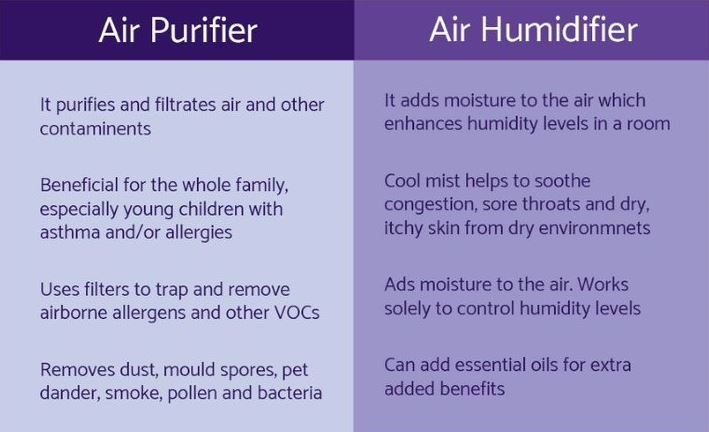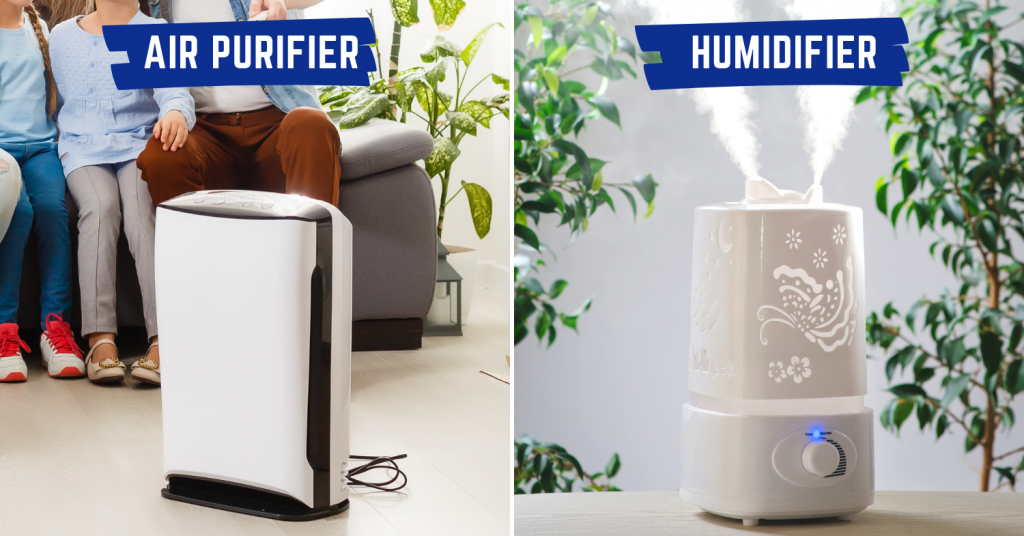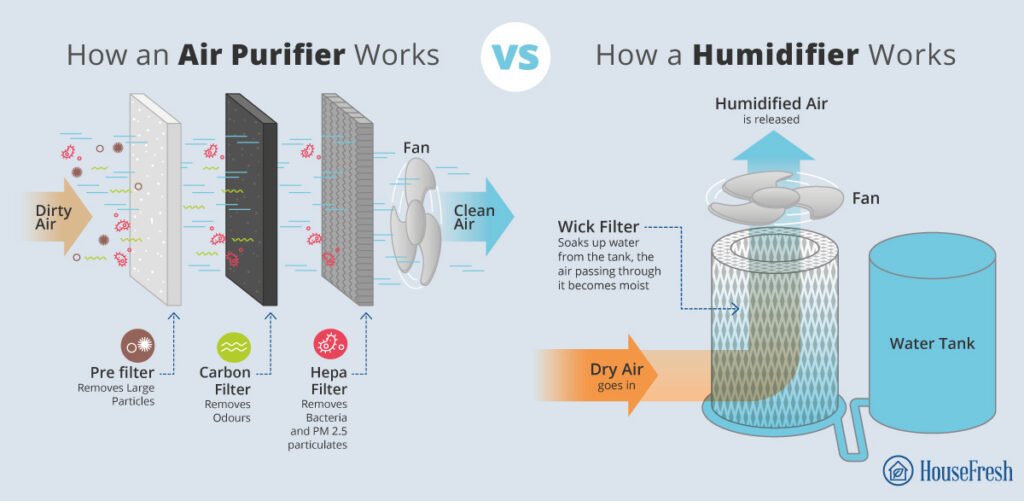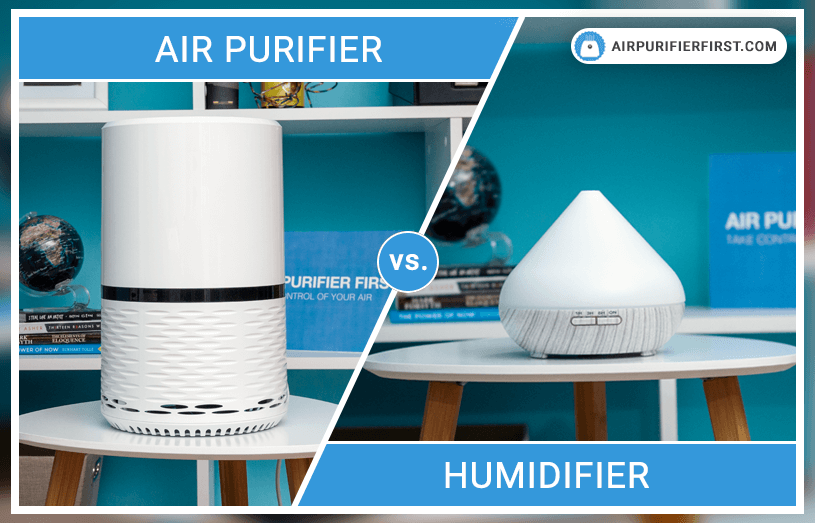
You’ve probably heard about air purifiers and air humidifiers, but do you know the differences between them? As the name suggests, air purifiers focus on cleaning the air by removing pollutants and allergens, while air humidifiers are designed to add moisture to the air. While both have their own benefits, it’s important to understand their unique functions and features in order to make the right choice for your home or office. So, let’s explore the differences between these two devices and discover which one suits your needs best.
The Purpose of Air Purifiers
Air purifiers are designed to remove pollutants and allergens from the air, improving the overall air quality in your home or workplace. These devices work by filtering the air through various layers, trapping particles such as dust, pollen, pet dander, and mold spores. By eliminating these contaminants, air purifiers can greatly reduce the risk of respiratory issues and allergies. In addition, they also help in reducing odors and eliminating harmful germs and bacteria.
Types of Air Purifiers
There are several types of air purifiers available on the market, each with its own unique way of purification:
HEPA filters
HEPA (High-Efficiency Particulate Air) filters are highly effective at removing a wide range of particles, even those as small as 0.3 microns. These filters consist of a dense mesh that captures airborne particles and prevents them from re-entering the room.
Activated carbon filters
Activated carbon filters are specifically designed to remove odors, harmful gases, and volatile organic compounds (VOCs) from the air. These filters contain a form of treated carbon that absorbs these pollutants, leaving the air clean and fresh.
UV germicidal lamps
UV germicidal lamps are used to sterilize and kill bacteria, viruses, and other microorganisms in the air. These lamps emit ultraviolet light that disrupts the DNA of these organisms, rendering them harmless.
Ionic generators
Ionic generators release negatively charged ions into the air, causing pollutants and allergens to stick to nearby surfaces. This can be an effective way to remove these particles from the air, but it is important to note that they may produce ozone as a byproduct.
Ozone generators
Ozone generators work by producing ozone, a highly reactive gas that can neutralize and eliminate odors, bacteria, and viruses. However, it is essential to use ozone generators with caution as high levels of ozone can be harmful to humans and pets.

This image is property of blog.clevamama.com.
The Purpose of Air Humidifiers
Air humidifiers, on the other hand, serve a different purpose. These devices are designed to add moisture to the air, balancing humidity levels and preventing dryness. While air purifiers focus on improving air quality, humidifiers primarily target the overall moisture content in the environment.
Types of Air Humidifiers
Just like air purifiers, there are different types of air humidifiers available, each employing a unique method of adding moisture to the air:
Ultrasonic humidifiers
Ultrasonic humidifiers use ultrasonic vibrations to break water into microscopic particles, producing a fine mist that is released into the air. These humidifiers are known for their quiet operation and can effectively humidify large areas.
Evaporative humidifiers
Evaporative humidifiers utilize a fan to draw air across a wet wick or filter, causing water to evaporate and increase the humidity. This type of humidifier is often more affordable and energy-efficient, making it a popular choice for many households.
Steam vaporizers
As the name suggests, steam vaporizers heat water to produce steam, which is then released into the air. These humidifiers can be beneficial for respiratory conditions, as the steam helps to soothe dry airways.
Impeller humidifiers
Impeller humidifiers use a rotating disc to break water into droplets, dispersing them into the air as a cool mist. This type of humidifier is often smaller and more portable, making it ideal for use in nurseries or smaller rooms.

This image is property of airpurifiers.sg.
Mechanism of Air Purifiers
Air purifiers work by pulling air into the unit and passing it through various filtration layers. These layers are designed to capture and trap particles as the air moves through the system. HEPA filters, for example, consist of tightly woven fibers that can trap small particles, while activated carbon filters absorb odors. Once the air is purified, it is released back into the room, ensuring a clean and fresh environment.
Mechanism of Air Humidifiers
Air humidifiers add moisture to the air through different mechanisms, depending on the type of humidifier. Ultrasonic humidifiers use ultrasonic vibrations to break water into fine mist particles, which are then released into the air. Evaporative humidifiers work by evaporating water from a wet wick or filter, increasing humidity levels. Steam vaporizers heat water to produce steam, while impeller humidifiers break water into droplets to disperse them as a cool mist. Adding moisture to the air not only relieves dryness but also helps to soothe respiratory symptoms caused by dry air.

This image is property of afresherhome.com.
Benefits of Air Purifiers
Air purifiers offer a multitude of benefits for both allergy sufferers and those concerned about air quality:
Reducing asthma and allergy symptoms
By capturing and eliminating airborne particles such as dust, pollen, and pet dander, air purifiers can significantly reduce the triggers that cause asthma and allergy symptoms. The improved air quality can provide relief and help manage these conditions.
Eliminating pet dander and odors
For households with pets, air purifiers can be highly beneficial in removing pet dander, which is a common allergen. Additionally, they can eliminate pet odors, ensuring a fresh-smelling environment.
Improving overall respiratory health
By removing pollutants and irritants from the air, air purifiers help to improve respiratory health. This is particularly beneficial for individuals with respiratory conditions such as asthma or chronic obstructive pulmonary disease (COPD).
Benefits of Air Humidifiers
Air humidifiers play a vital role in maintaining a comfortable and healthy indoor environment. Here are some of the benefits they offer:
Relieving dry skin and sinus congestion
Dry air can cause skin to become dry, flaky, and itchy. Air humidifiers add moisture to the air, preventing dryness and maintaining healthier skin. They also help relieve sinus congestion by moisturizing the nasal passages.
Soothing dry throat and cough
Dry air can aggravate throat irritation and coughing. By increasing humidity levels, air humidifiers provide relief for these symptoms, allowing for easier breathing and a more comfortable sleep.
Preventing static electricity
Dry air tends to create static electricity, leading to uncomfortable static shocks. Air humidifiers help to balance humidity levels, minimizing static electricity and creating a more pleasant living environment.

This image is property of housefresh.com.
Considerations while Choosing an Air Purifier
When selecting an air purifier, there are several factors to consider:
Room size and coverage area
It is essential to choose an air purifier that is suitable for the size of the room or space where it will be used. Different purifiers have different coverage areas, so be sure to check the manufacturer’s recommendations.
Types of filters and their maintenance
HEPA filters are highly effective at capturing particles, but they do require regular maintenance and replacement. Consider the availability and cost of replacement filters when choosing an air purifier.
Noise levels and energy consumption
For maximum comfort, consider the noise levels produced by the air purifier. Some models operate silently, making them suitable for bedrooms or quiet spaces. Additionally, energy consumption is an important consideration to minimize electricity usage.
Considerations while Choosing an Air Humidifier
When choosing an air humidifier, keep the following factors in mind:
Coverage area and tank capacity
Assess the size of the room or space you want to humidify and select a humidifier that adequately covers the area. Tank capacity is also important, as it determines how long the humidifier can run before requiring a refill.
Types of humidification methods
Different humidifiers use various methods to add moisture to the air, so choose the one that best suits your needs. Consider factors such as noise levels, mist output, and ease of maintenance.
Noise levels and energy consumption
Similar to air purifiers, consider the noise levels produced by the humidifier to ensure a peaceful environment. Energy consumption should also be taken into account to avoid excessive energy usage.
In conclusion, air purifiers and air humidifiers serve different purposes but both contribute to creating a healthier and more comfortable indoor environment. Air purifiers remove pollutants and allergens, improving air quality and reducing respiratory issues, while air humidifiers add moisture to the air, relieving dryness and soothing respiratory symptoms. Consider your specific needs and the factors mentioned when choosing the right device for your home or workplace.

This image is property of www.airpurifierfirst.com.






